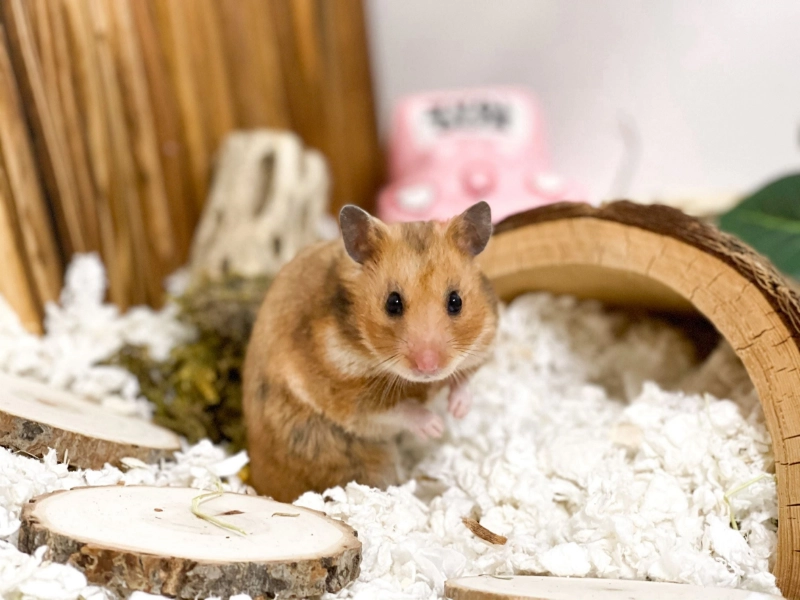Children and families frequently keep hamsters as pets. However, if handled improperly, they might become problematic. For instance, because they are nocturnal, hamsters are often startled when disturbed. When alarmed, they may also bite.
This is an issue, especially for young children who lack the motor skills necessary to appropriately handle a small animal. The animals are also susceptible to inherited illnesses and may be salmonella carriers.
They are vulnerable to inherited illnesses.

Advertisement
Due to their limited vision, hamsters must navigate their environment using their senses of taste and smell. As a result, they will bite you if you approach too closely or try to feed them. Since their teeth are fairly sharp, these bites hurt and may bleed. Children are especially vulnerable to getting bitten because they frequently interact with the animals in their cages without considering how their actions might make them feel.
Actinomycosis, a fungal infection that results in swelling of the skin and other organs, is a sickness that some hamsters have. It can produce flu-like symptoms in the mother and cause miscarriage or birth abnormalities in the fetus, making it especially dangerous for a pregnant hamster.
Salmonella, an intestinal bacterium that causes brief spells of disease in healthy individuals, is another infection that hamsters frequently contract. However, if a pregnant woman transmits the bacteria to her unborn child or if it spreads to people with weakened immune systems, it may result in more severe issues.
They frequently bite.

Biting is a pretty common behavior in hamsters, especially when they're anxious or bored. If they're attempting to flee, they might also bite. Children may lose interest in their pet or develop fears of it as a result of this, which may be very frightening. Giving your hamster plenty of space and hiding spots in their habitat is the best way to stop this.
Additionally, to let them know you are there, approach their cage carefully and speak softly whenever you are close to it. Keep in mind that your hamster is unfamiliar with you and that most things about you are probably unfamiliar to them. At first, they might perceive you as a threat, and they might attempt to bite you in order to cover up a sickness or injury. Hamsters can develop into adorable little furries who love to be caressed and like playing with you with time and moderate handling in the beginning. Additionally, to make sure your hamster is seen if they are ill, search for a veterinarian who has experience with exotic animals.
They are likely to flee.

Due to their limited vision, hamsters must use their senses of taste and smell to find their way around. They become more likely to bite, which can be a major issue. Their razor-sharp fangs have the power to rip right through your skin, leaving you bleeding. Additionally, Salmonella is more likely to infect them, which can lead to flu-like symptoms, fever, diarrhea, and inflammation of the brain and the membrane around it. Salmonella can also be transmitted to people. Additionally, it can spread to a pregnant person, causing miscarriage or birth abnormalities.
Your hamster may be bored or overstimulated if they keep trying to escape from their cage. You might try letting them spend more time outside of their cage or furnishing their home with toys and tunnels. You might need to better escape-proof their cage if they're still getting out. Make sure they have access to enough food and drink. Hamsters are nocturnal, so make sure to check their hiding places at night. They may be searching for food if you hear chewing or rustling.
They have a salmonella risk.

Despite being beautiful and cute, hamsters can actually transmit salmonella, which can give humans terrible illnesses. This is especially concerning for pregnant women, kids, and those with compromised immune systems.
As a result of their weak vision, hamsters must rely on their senses of taste and smell to distinguish their surroundings. Unfortunately, this implies that if you stick your fingers or hand inside their cage, they'll probably bite you. Since their teeth are fairly sharp, these bites can cause pain and bleeding.
In addition, because hamsters are nocturnal animals, handling them during the daytime usually causes them to get alarmed. They may bite their owners as a result, since they are scared and quickly upset. Additionally, skin abscesses (pockets of infected pus beneath the skin) can happen. These are typically brought on by bacterial infections of wounds from fighting with cagemates or by wood shaving injuries to the hamster's paws or shoulders.












